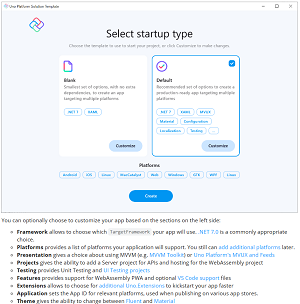News
Uno Platform 4.8 Intros Startup Wizard
Responding to user requests for a more seamless startup experience, Uno Platform 4.8 introduces a new App Template wizard to do just that.
Those requests stemmed from a 2023 roadmap survey conducted by Uno Platform, used to create single-source, multi-platform applications that let developers reuse 99 percent of the business logic and UI layer across native mobile, web and desktop projects.
The open source Uno Platform is a dev tooling partner of Microsoft, claiming the only offering that enables development of single-codebase applications for Windows, WebAssembly, iOS, macOS, Android and Linux, targeting all OSes and browsers. It has also teamed up with Redmond on various projects and has sometimes implemented new tech before Microsoft itself.
The App Template Wizard guides developers through the set-up process, allowing them to first choose a startup type, blank or default, with the latter containing several default choices for various options like target framework (like .NET 7), supported platforms, extensions, themes, presentation (MVVM or Uno Platform's MVUX and Feeds) and so on.
 [Click on image for larger view.] Uno Platform Solution Template (source: Uno Platform).
[Click on image for larger view.] Uno Platform Solution Template (source: Uno Platform).
The release also includes:
- Support for .NET 8 Preview 2, which was shipped by Microsoft on March 14.
- A new, simplified way of initializing both the Uno Toolkit and Material theme resources.
- Improvements to Design System Package (DSP) importing, with tooling automatically set up by the App Template wizard to allow, for example, the import of custom DSPs to Uno Platform-built applications. Thus developers can use tools like Material Design Theme Builder to create a custom theme that matches a brand and then import that theme to their Uno Platform applications.
- A new feature called Uno Resizetizer to simplify image resizing for cross-platform apps made with .NET. Allowing for the use of SVG vectors as source assets and automatically resizing them to every resolution an app needs at build time, the tool is based on a library originally created by Jonathan Dick (.NET MAUI tech lead).
- Enhancements to extensions including the company's Reactive or MVUX (MVU for Cross-Platform) framework that provides helper features to ease application development.
More information on all of the above can be found in the March 21 blog post announcing v4.8.
About the Author
David Ramel is an editor and writer at Converge 360.